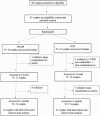A Controlled Pilot Study of the Wish Outcome Obstacle Plan Strategy for Spouses of Persons With Early-Stage Dementia
- PMID: 34171086
- PMCID: PMC8893137
- DOI: 10.1093/geronb/gbab115
A Controlled Pilot Study of the Wish Outcome Obstacle Plan Strategy for Spouses of Persons With Early-Stage Dementia
Abstract
Objectives: Behavioral interventions can reduce distress for couples coping with early-stage dementia. However, most interventions are limited in accessibility and fail to address individualized goals. This pilot study examined the dyadic effects on multiple indicators of well-being of the Wish Outcome Obstacle Plan (WOOP) intervention, which guides participants to use Mental Contrasting with Implementation Intentions to achieve attainable goals in their daily lives.
Methods: This randomized controlled trial included 45 older persons with early-stage dementia (PWD) and their spousal care partners (CPs: n = 90 individuals). CPs were assigned randomly to WOOP training immediately after baseline (WOOP) or after a 3-month follow-up interview (Control; CON). Both groups received a dementia care education booklet. WOOP CPs were instructed to practice WOOP at least once a day for 2 weeks. All CPs and PWDs completed home surveys (baseline, 2 weeks, and 3 months), measuring perceived stress, depressive symptoms, quality of life, and affect.
Results: Mixed-effects models showed significant intervention × time interaction effects with large effect sizes for CPs on three of the five outcomes over 3 months. Compared with CON, WOOP CPs had decreased perceived stress (δ = 1.71) and increased quality of life (δ = 1.55) and positive affect (δ = 2.30). WOOP PWD showed decreased perceived stress (δ = 0.87) and increased quality of life (δ = 1.26), but these effects were not statistically significant.
Discussion: WOOP is a promising, brief intervention to improve dementia CPs' well-being that may also positively affect their partners with dementia.
Trial registration: ClinicalTrials.gov NCT03691428.
Keywords: Affect; Behavioral interventions; Caregiving; Dementia; Mental contrasting with implementation intentions.
© The Author(s) 2021. Published by Oxford University Press on behalf of The Gerontological Society of America. All rights reserved. For permissions, please e-mail: journals.permissions@oup.com.
Figures



References
-
- Adriaanse, M. A., Oettingen, G., Gollwitzer, P. M., Hennes, E. P., De Ridder, D. T., & De Wit, J. B. (2010). When planning is not enough: Fighting unhealthy snacking habits by mental contrasting with implementation intentions (MCII). European Journal of Social Psychology, 40(7), 1277–1293. doi:10.1002/ejsp.730 - DOI
-
- Aiken, L. S., & West, S. G. (1991). Multiple regression: Testing and interpreting interactions. Sage.
-
- Allison, P. D. (2001). Missing data (Vol. 136). Sage. doi:10.4135/9780857020994.n4 - DOI
-
- Andresen, E. M., Malmgren, J. A., Carter, W. B., & Patrick, D. L. (1994). Screening for depression in well older adults: Evaluation of a short form of the CES-D. American Journal of Preventive Medicine, 10(2), 77–84. doi:10.1016/S0749-3797(18)30622–6 - DOI - PubMed
-
- Arbel, I., Bingham, K. S., & Dawson, D. R. (2019). A scoping review of literature on sex and gender differences among dementia spousal caregivers. The Gerontologist, 59(6), e802–e815. doi:10.1093/geront/gny177 - DOI - PubMed

